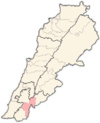Bani Haiyyan
Appearance
Bani Haiyyan
بني حيان | |
|---|---|
Village | |
| Coordinates: 33°14′35″N 35°29′15″E / 33.24306°N 35.48750°E | |
| Grid position | 193/294 PAL |
| Country | |
| Governorate | Nabatieh Governorate |
| District | Marjeyoun District |
| Elevation | 505 m (1,657 ft) |
| Time zone | UTC+2 (EET) |
| • Summer (DST) | UTC+3 (EEST) |
| Dialing code | +961 |
Bani Haiyyan (Arabic: بني حيان) is a village in the Marjeyoun District in southern Lebanon.
Name
[edit]According to E. H. Palmer, the name comes from the Arab tribe of Beni Haiyan.[1]
History
[edit]In 1875 Victor Guérin found here about 100 Metuali inhabitants. He further noted: "All the houses are built of regular stones belonging to ancient buildings, and most of the doors have fine lintels."[2]
In 1881, the PEF's Survey of Western Palestine (SWP) described it as: "A small village, built of stone, containing about fifty Metawileh, situated on the side of a hill and surrounded by figs, olives, and arable land. The water supply is from about ten rock-cut cisterns in the village and a birket near."[3]
References
[edit]Bibliography
[edit]- Conder, C.R.; Kitchener, H.H. (1881). The Survey of Western Palestine: Memoirs of the Topography, Orography, Hydrography, and Archaeology. Vol. 1. London: Committee of the Palestine Exploration Fund.
- Guérin, V. (1880). Description Géographique Historique et Archéologique de la Palestine (in French). Vol. 3: Galilee, pt. 2. Paris: L'Imprimerie Nationale.
- Palmer, E.H. (1881). The Survey of Western Palestine: Arabic and English Name Lists Collected During the Survey by Lieutenants Conder and Kitchener, R. E. Transliterated and Explained by E.H. Palmer. Committee of the Palestine Exploration Fund.
External links
[edit]- Bani Haiyane, Localiban
- Survey of Western Palestine, Map 2: IAA, Wikimedia commons


